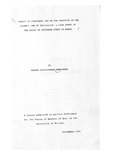| dc.description.abstract | This work has been as a result of two perplexing views
expressed in other works on the subjects, shariah and Islam
amongst the Adigo people. On the Shariah, attention was drawn on
the attitudes of orientalistic scholarship on the Shariah.
Specifically this has been an attempt to counter the doubts and
skepticism expressed in other works on the validity and
authenticity of the Shariah as a system of law and doubts on its
sources as viable for a system of law.
This survey therefore is an attempt to explain the Shariah and
verify the doubts about the sources of Shariah. While other works
tend to term the sources of Shariah as 'alleged' our study attempts
to explain what the Shariah is , what are its sources and what is
the scope of these sources in the formulation of the Shariah. On
the sources of Shariah, this study defines the meaning of each one
of them and proceeds to articulate how that particular source can
be used to formulate the Shariah.
Collaborative evidence on all sources of Shariah is sought to
verify the authenticity of the sources. It is found herein
evidence from the Quran that explains why the Quran can be used as
a source of Shariah. Thus on the authenticity and validity of the
Shariah, this work contributes to knowledge and explication
of the sources of shariah and their limitations in the corpus of
Islamic jurisprudence.
On the Adigo, concern has been on the fact that Adigo people
are indigenous and Islam as a religion has been alien. This has
been the basis of some scholars to contend that the traditional
practice of inheritance of the Adigo is in conflict with Islamic
teachings and practice of the law of succession. Basically the
'alleged' matrilineal practice of the Adigo has been argued as the
factor that has shown the conflict between Islamic and traditional
practice.
An attempt has been made to discuss the emergence and spread
of Islam amongst the Adigo. The spread of Islam was not
spontaneous. The gradual acceptance of Islam may have led to cases
of parallelism. However the trend did change and strict Islamic
practice has been observed.
since the law of succession has been explained as the born of
contention between Islam and traditional' Adigo practice, this
survey has specifically dealt with the principles of the two
systems of law in order to compare them and discover the conflicts
and possible accommodations. Our intention here has been to
diagnose the problem and look for possible solution.
The Islamic Law of Succession is thus investigated in its
development during the Jahilliya period. The reforms introduced by
the Quran and the general exposition of the Shariah and its rules
of application give the corpus of the Islamic law of succeSSlon.
The same has been done on the Adigo people. Basing our findings on
the ethos and principles which are the guidelines on the
administration of the law of succession, we find that the Adigo
traditional practice is minimal, naturally its towards extinction.
However the study did reveal that, the Adigo traditional
practice of 'Kuhala Ufwaa' which is synonymous with inheritance has
been patrilineally based. The notion that Adigo are traditionally
a matrilineal society becomes rather inconsistent when reference is
made to their practice of inheritance. Further, Adigo people
contemporarily recognise and trace descent both patrilineally and
matrilineally. This makes it similar to the Islamic practice of
reckoning fami ly relationships. However amongst the Adigo the
descent group has been found to have certain advantages over
another in the life of an individual.
In practice of the law of 'nReritance, there has been minor
conflicts contemporarily. This has been a result of the Islamic
awakening observed amongst muslim youth who aspire to be governed
by the Shariah than the traditional practice. How Islamic
education has managed to achieve this, and what challenges it might
have faced may be of interest to other researchers | en |

